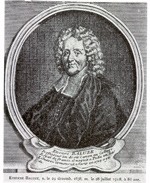Étienne Baluze
| Étienne Baluze | |
|---|---|
 |
|
| Born | 24 November 1630 Tulle |
| Died | 28 July 1718 (aged 87) Paris |
| Occupation | Librarian Historiographer |
Étienne Baluze (November 24, 1630 – July 28, 1718) was a French scholar, also known as Stephanus Baluzius.
Born in Tulle, he was educated at his native town, at the Jesuit college, where he studied the Arts. He then moved, on 31 December 1641, to the University of Toulouse, where, at the age of fifteen, he became a member of the Collège de St. Martial. He took minor orders, being called a "cleric", in his admission certificate. As secretary to Pierre de Marca, archbishop of Toulouse, he won his appreciation of him, and at his death Marca left him all his papers. Baluze produced the first complete edition of Marca's treatise De libertatibus Ecclesiae Gallicanae (1663), and brought out his Marca hispanica (1688).
In about 1667, Baluze entered Colbert's service, and until 1700 was in charge of the invaluable library belonging to that minister and to his son, Marquis de Seignelay. Colbert rewarded him for his work by obtaining various benefices for him, and the post of king's almoner (1679). Subsequently Baluze was appointed professor of Canon law at the Collège de France on December 31, 1689, and directed it from 1707 to 1710.
He was unfortunate enough to take up the history of the House of Auvergne just at the time when the cardinal de Bouillon, inheritor of the rights, was endeavouring to prove the descent of the La Tour family, in the direct line from the ancient hereditary counts of Auvergne of the 9th century.
As authentic documents in support of these pretensions could not be found, false ones were fabricated. The production of spurious genealogies had already been begun in the Histoire de la maison d'Auvergne published by Christophe Justel in 1645; and Chorier, the historian of Dauphiny, had included in the second volume of his history (1672) a forged deed which connected the La Tours of Dauphiny with the La Tours of Auvergne. Next manufacture of forged documents was organized by Jean de Bar, an intimate companion of the cardinal. These documents succeeded in duping the most illustrious scholars; Dom Jean Mabillon, the founder of diplomatics, Dom Thierry Ruinart and Baluze himself, called as experts, made a unanimously favourable report on July 23, 1695. But cardinal de Bouillon had many enemies, and a war of pamphlets began.
...
Wikipedia
